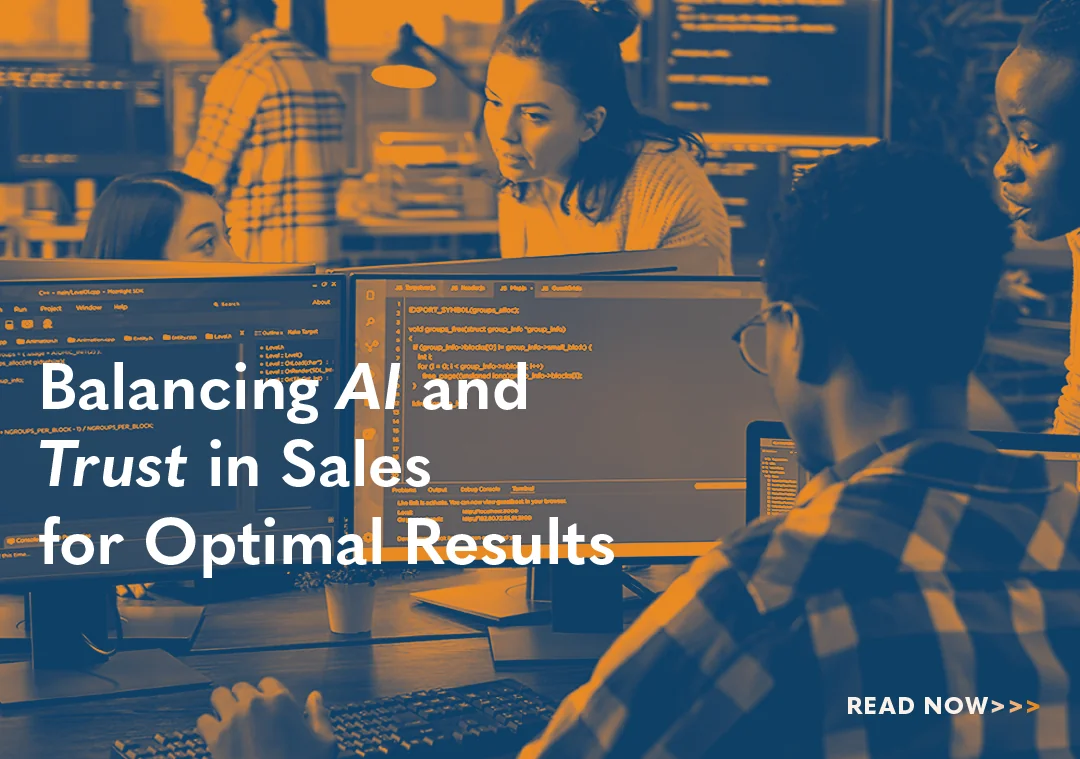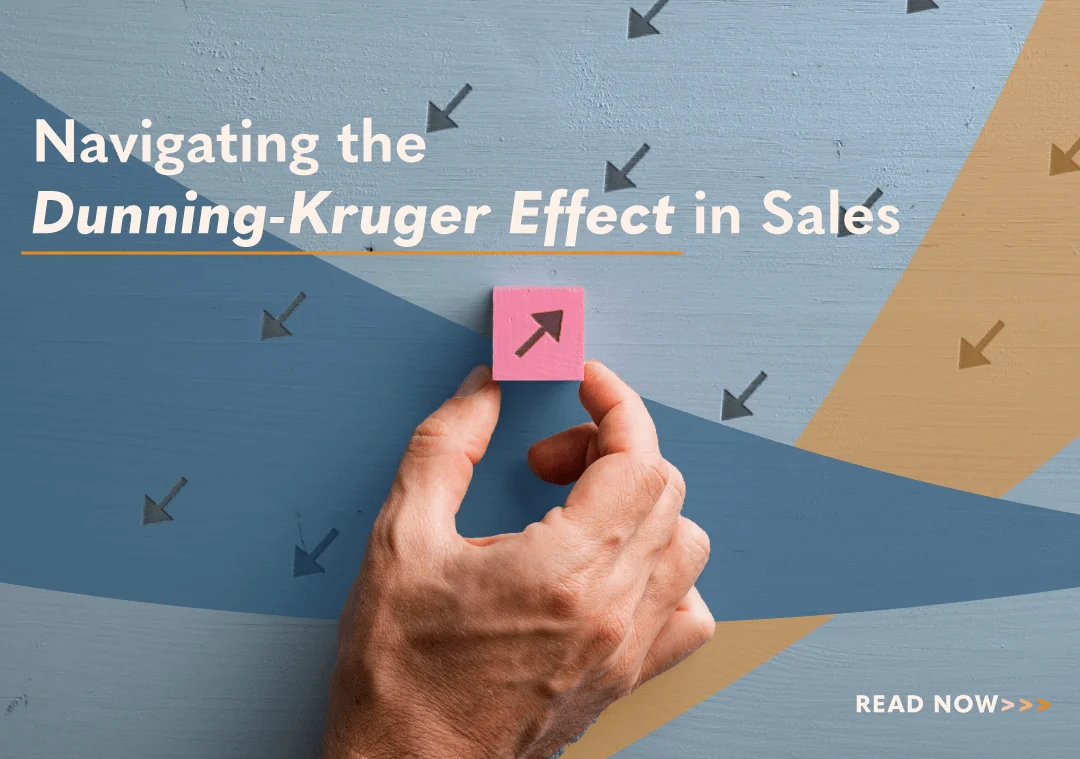Balancing AI and Trust in Sales for Optimal Results

Sales technology feels like it is evolving faster than we can keep up. Especially when it comes to recent advancements in artificial intelligence (AI). Here I will explore the current state of AI in sales, and its potential for improving seller productivity.
Before making a rush to judgment, I need to qualify my position on artificial intelligence. AI is a transformative technology that will change society more than the internet. But I agree with Fei-Fei Li, a prominent computer scientist, and AI researcher, who said, “The science of AI has no goal of replicating human intelligence perfectly. It’s really about building tools that can amplify us, help us think, and help us make better decisions.”
What I am hearing from sales leaders is an attitude of deploying AI now and figuring out the details later. Anyone who has been in sales longer than a day knows there is a thin line between a happy client and a frustrated prospect. The irony of adding AI to B2B sales is the risk of making the sales process “artificially impersonal” and missing the point of genuine human connections.
The Obvious Sales AI Benefits
I’ve received enough bad sales emails to realize that generative AI can improve the average sales reps’ writing. Additionally, AI excels at handling mundane administrative tasks and reducing the productivity-draining activities that sales reps often encounter. However, if AI can augment sales activities, what could possibly be better? One key factor comes to mind: customer interactions.
When we think about a sales interaction, do we envision a chatbot or a copy-and-paste response? Most likely, neither one of these options. An optimized sales interaction goes beyond automated responses and involves a tailored and personalized sales approach. At Janek, we refer to this approach as becoming a trusted advisor. In complex sales scenarios, buyers prefer to work with trusted advisors because the potential negative consequences of a poor decision can be significant.
I’ve written about the value of a trusted advisor before and how AI may replace the transactional salesperson. But for complex sales requiring a trusted advisor, AI has the potential to be an obstacle to an optimized sales interaction. Why? Because after all the mundane sales tasks are removed, sales reps are still required to develop a trusted advisor relationship with the client.
Sales talent development is a process that includes learning through mistakes, gaining experience, and continuously refining skills. However, if we rely solely on AI for decision-making, we risk depriving sales reps of valuable learning opportunities and impeding their growth. Relying too heavily on AI may lead to a more transactional sales approach when the customer would likely value a trusted advisor on their side.
Learning from mistakes, adapting strategies, and refining skills are fundamental elements of sales development that can only be partially replicated by sales AI alone. It is crucial to strike a balance, leveraging AI as a tool to enhance sales capabilities while fostering an environment that encourages learning, personal growth, and the development of critical skills through hands-on experience.
In complex sales, the initial meeting is a crucial first step, but it is far from a transactional encounter. Throughout various CRMs, we often come across opportunities labeled as “no-decision,” highlighting the challenges sales professionals face in progressing deals. This is where AI can make a significant impact by providing a feedback loop of sales insights.
Each sales call holds the potential to learn something valuable that sales reps cannot know any other way but through live human-to-human interaction with customers. It is through these interactions that unique knowledge and understanding are gained. Sales leaders may find diminishing returns in optimizing sales activities alone. Embracing actionable sales insights from every interaction will lead to exponential returns.
The AI Sales Paradox
B2B sales teams have evolved significantly, adopting account-based go-to-market strategies and establishing RevOps teams to foster a unified view of revenue and customer behaviors. The introduction of AI further amplifies this sophistication by offering predictive analytics for forecasting events and dynamic next-best actions based on real-time data and generative messaging.
Paradoxically, this advancement in AI-driven sales sophistication has unintentional consequences. It has led to a rise in buyers who prefer to remain anonymous and engage in a self-service buying process. However, according to Gartner’s CSO & Sales Leader Conference, buyers who avoid human interaction during the sales process often experience higher levels of purchase regret than those who interact with salespeople. It is impossible to optimize customer satisfaction without trusted advisor interaction in complex sales.
In many B2B buying scenarios, decision-makers face a barrage of solicitations. With tools like LinkedIn Navigator, third-party providers offering intent data, social listening technology, and AI, decision-makers have become more adept at navigating the sales process. They have acquired expertise in avoiding being sold to, while sellers strive to catch up in their trust-building techniques.
Sales reps frequently struggle to generate sales momentum due to their failure to cultivate an internal champion within the buyer’s organization. Champions play a pivotal role in influencing purchasing decisions. A champion sees the benefit to their organization and trusts that introducing the product will have a positive impact on their career. No trust, no sale. It may seem paradoxical, but AI can hinder building trust in the sales process. Here’s how:
First, there is the potential for impersonal interactions. If AI is over-relied upon without human intervention, it can lead to impersonal interactions that erode trust. Customers value the personal connection and human element in sales interactions. If AI is overused or misapplied, customers may feel detached, perceiving the interaction as artificial or insincere. This can hinder trust-building and negatively impact the sales relationship.
Another trust-building barrier AI can create is our social or interpersonal intuition. AI can create a barrier between our perceptual skills while weakening our emotional intelligence skills. Drafting sales messages with AI can be a growth strategy for sales reps. Using AI to replace customer interactions can be a strategic sales mistake for sales leaders.
Trust is a foundation built upon authenticity and transparency. Customers can discern the difference between genuine emotional intelligence and an artificial façade. Establishing trust in sales involves empathetic understanding and tailored responses based on nonverbal cues such as tone, body language, and eye contact.
While conversational intelligence software can record and analyze sales sentiment, it introduces another concern. As long as sales leaders bear the consequences of failure, they are the ultimate responsible party.
They may delegate sales responsibility to AI, but selecting the right platforms is the sales leader’s responsibility since they will bear the consequences of bad outcomes. Delivering results while controlling costs will always be the sales leader’s responsibility.
AI is Long-Term Strategy
For sales AI to have a meaningful and significant impact, it must balance making the sales processes easier and providing a great customer experience. For sales leaders, the primary objective of AI is to assist the sales team rather than serving as a sales replacement or solution to poor sales skills.
When sales strategies fail, there are often multiple factors at play. From personal experience, a common culprit is treating the implementation of a new sales initiative as a one-time event. Whether it’s sales enablement, sales training, social selling, or sales AI, perceiving it as a singular occurrence is a sure path to failure.
Industry jargon emphasizes the importance of continuous learning and a holistic approach. Improving seller productivity boils down to enhancing deal velocity, win rates, and deal size. The most successful sales teams close deals faster, win more often, and close larger deals. Achieving these outcomes requires persistent determination rather than treating your AI initiatives as one-off events. Approaching AI without this mindset only serves as an obstacle to achieving sales high performance.
As a sales leader, I continually ask myself, “What is killing seller productivity today?” The answer is always the same—trust. Trust holds the power to transform buyer behavior into immediate and impactful actions.
The prevailing belief among sales leaders is that AI has the potential to enhance sales team efficiency and optimize decision-making. I agree. However, it is crucial to recognize that AI should never compromise trust. It must deliver tangible bottom-line benefits without sacrificing the fundamental pillar of trust, which forms the bedrock of successful sales relationships.
Conclusion
The AI sales arms race is the wake-up call in our lifetime for sales leaders. No one in sales can afford to sleep on the impact. However, it is crucial to recognize that AI is not a band-aid solution to poor sales skills. AI has the potential to amplify the shortcomings of ineffective salespeople, leading to even more frustration for buyers. While AI can enhance the productivity of both order-takers and order-makers, sales leaders must carefully evaluate whether they are adding 100 horsepower of AI sales productivity to a sales vehicle with a couple of flat tires.
Implementing sales AI without thoughtful consideration will undoubtedly have consequences. It is crucial to view AI as a tool that can amplify and elevate human potential rather than a substitute for it. By leveraging AI effectively, sales professionals can enhance their capabilities and achieve greater success, but it should never replace the core foundation of sales success—humans trusting humans.

- Account Planning (11)
- Awards (49)
- Client Testimonial (37)
- Personal Branding (19)
- Podcast (11)
- Research (70)
- Sales Career Development (87)
- Sales Coaching (156)
- Sales Consulting (137)
- Sales Culture (170)
- Sales Enablement (354)
- Sales Leadership (109)
- Sales Management (248)
- Sales Negotiation (16)
- Sales Prospecting (125)
- Sales Role-Playing (18)
- Sales Training (234)
- Selling Strategies (263)
- Soft Skills (70)
- Talent Management (94)
- Trusted Advisor (27)
- Virtual Selling (49)
- Webinar (9)


























